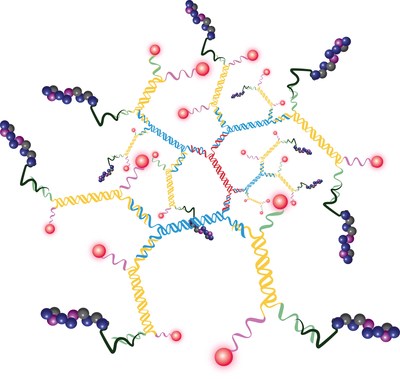Genisphere reported a publication in the journal Brain that demonstrates a novel 3DNA® nanocarrier shown to carry a peptide drug through the body and precisely target microglia cells in the brain
|
HATFIELD, Pa., Nov. 1, 2019 /PRNewswire/ -- Genisphere reported a publication in the journal Brain that demonstrates a novel 3DNA® nanocarrier shown to carry a peptide drug through the body and precisely target microglia cells in the brain. Using a model of premature infant brain injury, the 3DNA-based therapeutic targeted microglia and modified their cellular biology, which protected critical white matter tissue in the brain and improved animal behavior and memory.
The publication follows a collaborative research agreement with The Institut National de la Santé et de la Recherche Médicale (Inserm, The French National Institute of Health & Medical Research) to study targeted nanotherapeutics for neurological disease. Acclaimed scientists Dr. Pierre Gressens and Dr. Bobbi Fleiss are senior co-authors of the publication. Dr. Bobbi Fleiss, a Vice-Chancellor's Research fellow at Royal Melbourne Institute of Technology (RMIT) and Visiting Senior Research Associate at Inserm, explained, "The Wnt signaling pathway was known to be critical during embryonic development but we have shown for the first time that it controls the behavior of microglia, the brain's immune cells. We used 3DNA to deliver a Wnt agonist to keep this pathway active specifically in microglia in the injured brain. Without treatment, the microglia are overactive, eventually leading to brain damage." Professor Pierre Gressens, Research Director at Inserm and Professor of Neonatal Neurology at King's College London, commented, "We have validated the important role for Wnt by demonstrating that we can prevent microglia from acquiring an inflammatory phenotype that damages myelin in the brain, so now we must further study how to best bring this treatment closer to the clinic. This is clinically important research considering every year, 9 million preterm babies suffer neurological impacts from neuroinflammation and we currently have no treatments to repair this injury." Dr. Robert Getts, Genisphere's Chief Science Officer, said, "I thank all authors who contributed to this foundational publication. It is profound to see specific targeting of these specialized brain immune cells [the microglia] with systemic administration of the 3DNA-conjugate and observe positive effects in the short and long-term using low, infrequent doses. Given the role microglia play in a variety of neurodegenerative diseases, we have initiated work on new siRNA approaches at Inserm and additional brain injury paradigms at RMIT to expand these therapeutic strategies." The Brain article is titled "Decreased microglial Wnt/β-catenin signalling drives microglial pro-inflammatory activation in the developing brain" (DOI: 10.1093/brain/awz319) and summarized in a press release issued by RMIT. About Genisphere For more information contact:
SOURCE Genisphere |





